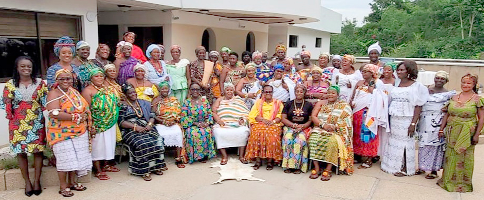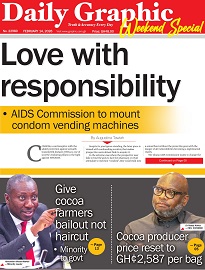Ghana News | Ghana Elections | Breaking News in Ghana

Queen mothers schooled on adolescent reproductive health
A three-day workshop aimed to enhance the capacity of queen mothers and traditional leaders on adolescent reproductive health has ended at Akosombo in the Eastern Region.
The programme, dubbed, “Engagement of Queen mothers on the prevention of teenage pregnancy” and organised by the United Nations Population Fund (UNFPA) and the Obaapa Development Foundation, followed the alarming rate of teenage pregnancy recorded in 2020, with Ashanti, Eastern and Greater Accra regions recording huge numbers of girls between the ages of 10 and 15 years said to be the most affected grouping.
Participants were drawn from eight regions with the aim to equip and empower them to enhance community education and parent-girl child communication as a means of reducing the occurrence.
The programme held under the United Nations (UN) Joint Programme for Empowering Adolescent Girls with funding support from the Global Affairs of Canada is on the theme: “Recognising traditional leaders, especially queen mothers as strong influences and critical partners in cube conversation facilitation”.
UNFPA
Speaking at the opening ceremony, the Programme Analyst for Communications and Partnership at UNFPA, Dr. Doris Mawuse Aglobitse, indicated that queen mothers continued to play a prominent role in establishing and maintaining norms that supported the development and well-being of especially adolescent girls.
According to her, the statistics had called for the need to deliberate on creating a conducive environment for adolescent girls to develop and also be protected from Sexual and Gender-Based Violence (SGBV).
“We want to enhance the knowledge of our queen mothers on SGBV, gender-sensitive adolescent, sexual and reproductive health and rights (SRHR), family planning among others since these are key to the reduction and prevention of teenage pregnancy,” Dr. Aglobitse said.
Development Oriented
The Paramount Queen mother of the Akwamu Traditional Area, Nana Afrakoma II, who chaired the function, observed that traditional leaders had important roles to play in the reduction of teenage pregnancies in their communities, regions and the country as a whole, stressing that, “If we do not do so now, then there will be no future for the country”.
She lamented that the data had shown that many of the young girls rescued from the streets for rehabilitation had found themselves pregnant again, and queried what should be done to change the situation of the ratings across all regions.
“It will be important for all of us to remain committed and aim at zero tolerance for teenage pregnancy,” Nana Afrakoma said.
The Executive Director of Obaapa Foundation, Nanaheema, Adwoa Awindor, in her remarks indicated that the expected outcome was to create a platform where the queen mothers could adequately engage their communities and create the needed awareness.
The traditional leaders, particularly the queen mothers, she said were strategic in addressing community issues and since teenage pregnancy continued to become the number one challenge in many communities, it had become necessary to support them to arrest the situation.


